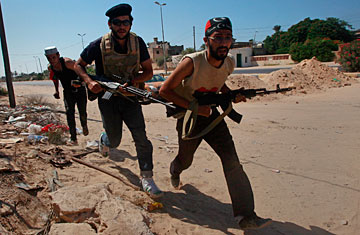
Libyan rebel fighters run for cover from incoming fire as they advance through the town of Mayah, 15 miles from Tripoli, August 21, 2011.
The Libyan rebels say, this is it: zero hour. And some members of the rebel forces and National Transitional Council in Benghazi have gone so far as to say they were planning it all along. "The zero hour was pre-planned, so that all the liberating forces can move in unision, and press forward toward Tripoli," Shamsiddin Abdulmolah, a member of the rebel's National Transitional Council in Benghazi told TIME over the phone on Sunday. "We've been planning it so that it coincides with the 20th of August — actually the 20th of Ramadan. The 20th of Ramadan is the day that Mecca was liberated during the prophet's time — when the prophet re-entered Mecca, so it would help spiritually to uplift the liberating forces," he continued. "Also, so it would come before the first of September which is the anniversary of Gaddafi's revolution."
The rebels planned their attack on the Libyan capital from three fronts, Abdulmolah says. And indeed, the fighting appeared to reach "zero hour" over the weekend, as rebel forces closed in from the town of Zawiyah, to Tripoli's west, and fighting broke out between rebels and government forces inside the capital.
But if Abdulmolah is exaggerating rebel gains and organizational capacity, it wouldn't be the first time. For months, the poorly armed and poorly organized rebel forces have repeatedly declared that victory is imminent, even as their forces have retreated under heavy shelling.
And yet, on Sunday, something seemed to give. Residents of Tripoli said the sounds of explosions and gunfire had broken up Saturday night, and it was clear that fighting had consumed several neighborhoods. Abdulmolah claimed that several areas in the capital had already fallen under the rebels' control, including Tajoura and Souk al-Jumaa, although that could not be independently verified. "Two-thirds of Tripoli has already been liberated," says Abdulmolah. "Those neighborhoods that have been liberated — the Gaddafi regime has started to fire some mortar shells in and around those areas."
Reports of some residents fleeing and others amassing arms trickled out of the capital. A doctor at Benghazi's airport, which has been used in recent weeks to shuttle the wounded and aid groups, said that aid groups were getting ready to board planes in the direction of the western front on Sunday. "The goal is to assess the medical status there and problems that they're facing. And then to try to contact any organizations, such as the Red Cross and Crescent, try to reach them," says Yasser al-Ogely, a surgeon, who will fly with a group of 15 doctors to Tunisia on Sunday night. "There was a cry for help via Al-Jazeera and other channels," he says. The consensus: it's time for the final push, and the rebels in the west need help.
But if Gaddafi's opponents are right that zero hour is, in fact, imminent, that raises the other nerve-wracking question of what comes next. Libyans reached by phone in the rebel capital of Benghazi said that the mood was calm; the central square by the sea was empty; and that security had returned — even though it has been less than a month after the rebel military commander (Gaddafi regime defector) Abdel Fatah Younis was killed in the custody of rebel forces after being accused of working for both sides.
Rebels in the east have also been stuck on the same semi-fluid frontline between 100 and 200 miles west of Benghazi for months, despite the aid of NATO air strikes, and the supply line provided by the rebel capital. Gaddafi's loyalists appear to remain strong in his hometown of Sert, which rises virtually halfway down the road from Benghazi to Tripoli. And rebels will also have to deal with the southern garrison town of Sabha.
Muatassim Mohamed Dakhil, a former aide to Abdel Fatah Younis, predicts that the liberation of Tripoli will spell the end for all the other battle zones. "In Brega [where Libya's eastern front is currently situated], they'll withdraw if Gaddafi falls," he says confidently."Saturday evening, the revolutionaries withdrew from Brega to give the Gaddafi forces an opportunity to withdraw. Because...there was an agreement from all fronts to focus on Tripoli."
But he pauses when asked to consider the possibility that it won't be that easy. "Maybe — well — of course, there will be more battles after the liberation of Tripoli, because Gaddafi's forces are still armed," he said. "So there could be some light street fighting. But we're optimistic that it won't last long." After that, he added: "The National Transitional Council will go immediately to Tripoli."
